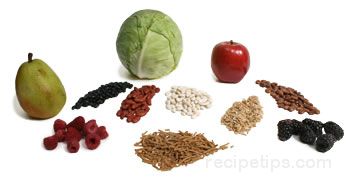There are two types of roughage or fiber: water soluble (i.e., gum, pectin, resins, and sap of plants) and water insoluble (i.e., cellulose, hemicellulose, and lingnin of plants). Barley, legumes, oat bran, and fruit (apples, citrus fruits, pears) are foods that contain soluble fiber while root vegetables cabbage, peas, beans, and foods with wheat bran or whole grains contain insoluble fiber. Each plays a role in providing a health benefit to our bodies. The soluable fibers assist to lower cholesterol in our bodies as well as maintaining a good balance of insulin and blood sugar levels for the prevention of diabetes. They decrease the rate that sugars (carbs) are digested as they enter our bodies, slowing our digestive process and assisting with the absorption of nutritents. The insoluble fibers, which are typically found in the nonseed or nonfruit parts of the plant, such as the leaves, hulls and stems, helps with the digestion process, absorbing water and passing foods more quickly through the stomach and intestines. The amount recommended for a healthy diet is 25 to 35 grams of fiber daily. When fiber consumption exceeds the recommended daily levels, it may cause a harmful effect that interferes with the minerals and vitamins normally absorbed as nutrients into our body.
A fiber supplement is a readily available alternative to the natural fiber from plant foods as a means to enable those who want to add fiber to their diet to do so when they are unable to consume the recommended daily amounts of natural fiber. However, caution is urged and guidlines must be followed to insure proper levels of nutrients are being adequately absorbed into the body and are not being hindered by the intake of fiber supplements. It is always best to maintain a proper balance of fiber naturally whenever possible.









